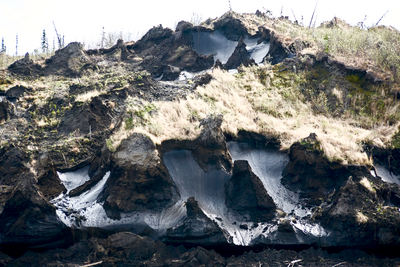Climate change amplified by permafrost cloud feedback

In a new study, Philipp de Vrese, Tobias Stacke, Veronika Gayler and Victor Brovkin use simulations with the ICON model to show that permafrost degradation facilitates a drying of the landscape and increases regional temperatures via an atmospheric feedback: During the warm season, drier surface conditions reduce the moisture transport into the atmosphere. The latter lowering the relative humidity in the boundary layer and diminishing low-altitude cloud cover. Since clouds reflect more sunlight than the snow-free land surface, the reduced cloudiness allows more solar radiation to reach the surface, increasing temperatures and accelerating the thawing of the ground.
The temperature effect of such permafrost cloud feedback is not limited to the regional scale, since higher temperatures in the Arctic and subarctic zones significantly impact the net energy difference between equatorial and polar regions. Despite the northern permafrost region covering only about 5 % of the globe, the study reveals this feedback effect is similar in magnitude to physical- and biophysical climate feedbacks acting on the global scale.

Philipp de Vrese, the lead author, commented: “It was really astonishing that a spatially limited process would have such large-scale consequences. Fortunately, the warming due to the permafrost cloud feedback is likely accounted for in the most recent projections, as we have merely isolated an effect that should already be included in simulations with current-generation models.” However, Tobias Stacke cautioned: “This depends also very much on how well the land surface models represent the hydrology in permafrost regions. Even in high-resolution simulations, many of the relevant processes cannot yet be represented.” Victor Brovkin added: “In the public debate, the impact of permafrost thawing on the climate is mostly associated with the resulting release of methane and carbon dioxide. It was surprising to find out that physical climate processes due to changes in permafrost hydrology could also strongly amplify global warming.”
Original publication
de Vrese, P., Stacke, T., Gayler, V., & Brovkin, V. (2024). Permafrost cloud feedback may amplify climate change. Geophysical Research Letters, 51, e2024GL109034. https://doi.org/10.1029/2024GL109034
Contact
Dr. Philipp de Vrese
Max Planck Institute for Meteorology
philipp.de-vrese@mpimet.mpg.de
